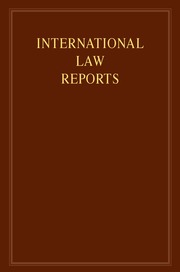No CrossRef data available.
Article contents
Othman v. United Kingdom
Published online by Cambridge University Press: 01 January 2021
Abstract
Human rights — Prohibition of torture — European Convention on Human Rights, 1950, Article 3 — Deportation of non-national to State of nationality — Whether substantial grounds for believing deportee would face a real risk of torture, inhuman or degrading treatment or punishment in receiving State — Assurances of good treatment in Memorandum of Understanding — Nature of assurances — Provision for monitoring — Whether sufficient to establish that deportation would not entail violation of Article 3
Human rights — Right to liberty — European Convention on Human Rights, 1950, Article 5 — Whether applicable in expulsion case — Deportation of non-national to State of nationality — Whether substantial grounds for believing that deportee would face a real risk of flagrant breach of Article 5 standards in receiving State
Human rights — Due process — European Convention on Human Rights, 1950, Article 6 — Deportation of non-national to State of nationality — Whether substantial grounds for believing deportee would face real risk offlagrant injustice in receiving State — Retrial for crimes of which deportee convicted in absentia — Risk that evidence obtained by torture would be admitted
Terrorism — Right of State to take firm stand against those involved in terrorism — Right to deport non-nationals suspected of involvement in terrorism — Absolute character of prohibition on torture, inhuman and degrading treatment and punishment — Whether substantial grounds for believing deportee would face a real risk of torture, inhuman or degrading treatment or punishment in receiving State
Treaties — Non-binding arrangements — Memorandum of Understanding — Relevance to question whether substantial grounds for believing deportee would face a real risk of torture, inhuman or degrading treatment or punishment in receiving State
Keywords
- Type
- Case Report
- Information
- Copyright
- © Cambridge University Press 2012


